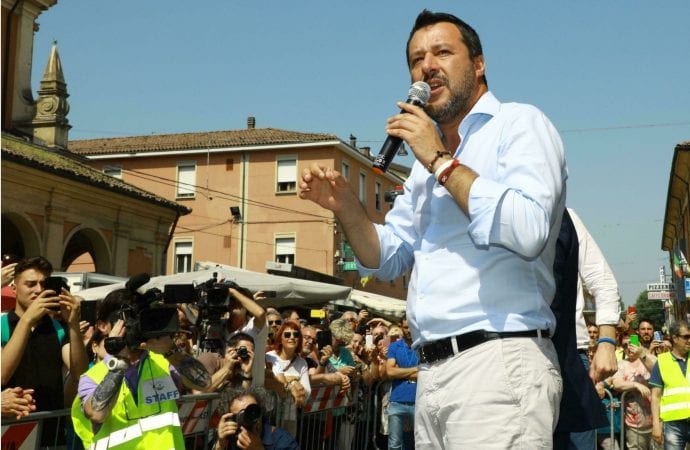No shot has been fired yet in the Mexican standoff that has seen Italian bishops go up against “one of the most influential leaders in Europe,” but while there have been efforts to ease the tensions neither of the two parties are quite ready to drop their weapons.
The right-wing populist party Northern League won the European Parliament elections in Italy by a landslide in May, and its leader, the Italian Vice Prime Minister Matteo Salvini, emerged as an even stronger force in Italian politics. But while Italian bishops and Pope Francis have expressed their willingness to dialogue, issues remain concerning Salvini’s hardline stance on immigration and his use of Catholic symbols to engage with voters.
“Salvini presents himself as the defender of Catholic values, for bringing back the names of mom and dad rather than parent one and two,” said Italian Cardinal Angelo Becciu, who heads the Vatican’s Congregation for the Causes of Saints, during a conference entitled “Francis’s Church” in Northern Italy June 9.
While this may lead some Italian Catholics to find in Salvini a person who represents their interests, the cardinal said, “I don’t like it. Someone who invokes saints and prays, is only a person who compromises himself” because “if you pray you do so for the good of everyone, not just for a few.”
Salvini hasn’t been shy about using Catholic symbols, such as the Bible and the rosary, to bring home a victory or reinforce his values. He has also made a point of only citing emeritus Pope Benedict XVI or John Paul II during his speeches: The one time he mentioned Francis during a May political rally in Milan, it was followed by a chorus of “boos.”
In a lengthy interview with Italian daily La Repubblica published on Sunday, the President of the Italian Bishops’ Conference (CEI), Cardinal Gualtiero Bassetti, said that the recent victory of the Northern League highlights “a profound crisis of other alternatives.”
“Sociological studies show us that it’s necessary to distinguish between cultural tradition, religion and faith: the social transformation in these years has not canceled a common vocabulary, which remains a call and a treasure for many who have a weak sense of belonging to the ecclesial community,” Bassetti said.
“For us, this represents the horizon of a renewed effort of Christian witness and presence,” the Cardinal of Perugia added. “Attempting to separate the faithful from the bishops, and especially from the pope, is a wrong and counterproductive maneuver.”
The two statements by the Italian prelates come at a time when the Vatican has attempted to open the door for dialogue with Salvini and his party, leaving him to decide whether he is willing to upset some of his hardline supporters in exchange for a photo-op with the pope.
“We must dialogue also with Salvini,” said the Vatican Secretary of State Cardinal Pietro Parolin in a May 30 interview with local reporters. Francis echoed the sentiment during his press conference aboard the papal flight returning from Romania June 2.
“The pope continues to say: Dialogue, dialogue, dialogue. And why not with Salvini? Dialogue must be made especially with those who don’t agree with us and with whom we have some challenges and problems,” Parolin said.
But, he added, “I think that by using religious symbols for party rallies there is a risk of abusing these symbols. On our part, we cannot be indifferent to this reality.”
In a Facebook live event soon after, Salvini thanked Parolin while adding that “I don’t think I have leprosy or the plague.”
The uncertainty of the relations between the two sides of the Tiber, the river separating the Vatican and the seat of the Italian government, is highlighted in the latest immigration drama that has taken hold of the peninsula.
A vessel off the Libyan coast carrying 62 immigrants from Africa was saved by a joint venture of Italian, Maltese and NGOs and entered the southern Italian port of Pozzallo on June 7. Salvini had vetoed the entrance of any migrant vessel in the country but could not close the ports to a ship carrying the Italian flag.
Following the same pattern used when immigrants arrived aboard a vessel in the city of Genoa last week, CEI took charge of the care and distribution of the passengers by placing them in immigration centers throughout the country or even in other EU states.
“The arrivals have diminished by 90 percent since last year,” Salvini said in a June 7 press conference, “and the few who still manage to arrive, like for example those who are arriving today, will be welcomed at the Vatican’s and Italian bishops’ expense. That way, everyone will do his part.”
In his interview, Bassetti emphasized that the work done by the Church is “a democratic necessity,” and he asked “those who govern to not unload their responsibility on others.”
“History teaches us that it’s never been a good choice to follow the powerful, perhaps hoping to get approval and privileges out of it,” the head of CEI added, “the Italian Church is a presence in service to all.”
It’s now up to Salvini to figure out the next move.

